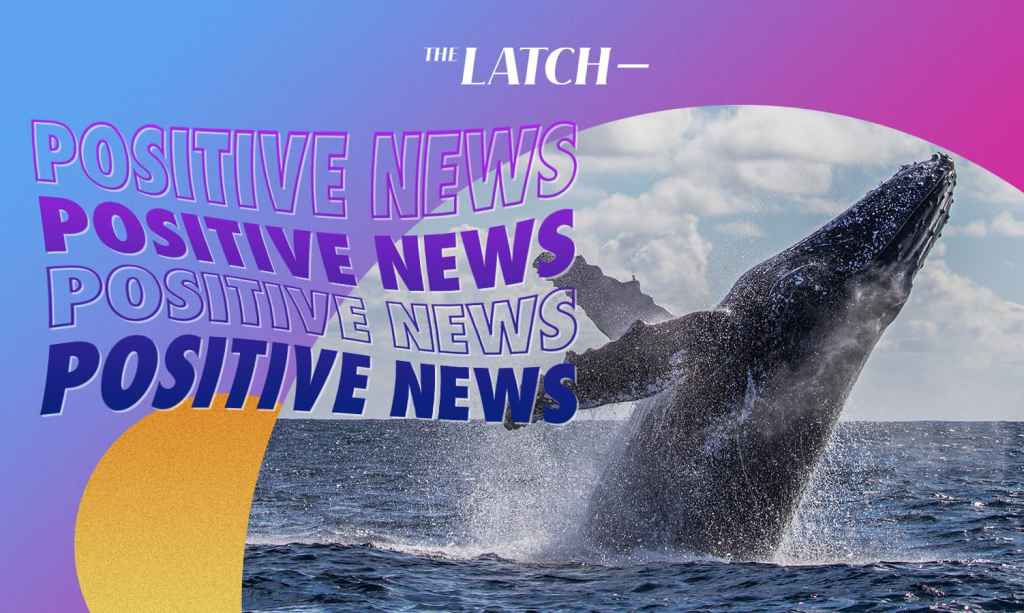Positive News is an ongoing series from The Latch turning the spotlight on all the good in the world that you may have missed.
Life is tough and the news cycle ain’t helping anything right now. Disaster, drama, and death sell papers and get eyeballs on the page but they don’t do much for our mental health.
If you’ve felt like simply switching off from the constant barrage of updates charting the world’s lurch from one crisis to the next, we’re here to provide you with a much-needed antidote.
Good stuff happens all the time. It just doesn’t get quite the same coverage as bad stuff. That means we end up thinking that everything that’s going on in the world is terrible when it really isn’t.
Here are five of the best news stories we’ve seen this week to put a spring in your step and make the world feel just that little bit brighter.
The UN Agrees to Create Global Plastic Treaty
The United Nations has agreed to create a “historic” global treaty on plastic pollution that could spell the end for unrestricted creation and disposal of the non-biodegradable product.
Members of the UN Environment Assembly discussed plans for more than a week in Nairobi, Kenya, before coming to an agreement on Wednesday that has been described as the most significant environmental deal since the 2015 Paris climate accord.
“We’re making history today and you should all be proud,” said Espen Barth Eide, president of the UN Environment Assembly.
“Plastic pollution has grown into an epidemic. With today’s resolution, we are officially on track for a cure.”
The resolution, which seeks to tackle plastic waste across the entirety of its lifecycle from creation to disposal, will be hammered out into a global treaty that UN officials say could be signed off in as little as two years.
Germany Will Be 100% Renewable By 2035, Thanks to Putin
All eyes have been on Russia and its invasion of Ukraine this week, with some heartbreaking stories emerging from the region. However, there are some silver linings to be gleaned from this disaster, including the fact that countries may look to ditch fossil fuels much faster than previously planned.
Germany, for example, has announced that it will aim to fulfil all of its electrical needs through renewable energy by 2035, pushing back its previous target of 2040, in an effort to free itself from reliance on Russian fossil fuels.
The Swiss company behind the Nord Stream 2 gas pipeline from Russia to Europe has also announced that it may have to consider bankruptcy after global sanctions on the source state blocked the pipeline’s completion.
The Russian attack, while tragic, could very well be a game-changer for global reliance on fossil fuels and speed up our transition away from their use.
COVID Cases and Deaths Continue to Fall Globally
With everything else that’s been going on in the past few weeks, you might be forgiven for thinking that the pandemic is over. Borders are opening up and international tourists are returning, however, we all know that the virus is lurking somewhere in the background.
While it’s no reason for complacency, the WHO has announced that, in some sense, the pandemic is very much past its peak and could soon be a distant memory.
Global COVID case numbers dropped by 16% last week, continuing a month-long trend of steady decline. Deaths also fell by 10%, a continued drop from last week’s decline in fatalities.
It also appears that the Delta strain is all but wiped out, with Delta making up just 0.3% of new cases, with 99.5% of the remainder being the milder Omicron variant.
Countries including the UK, Sweden, and Denmark have all seen dramatic falls in case numbers while immunization efforts press ahead. The US has announced that 73% of its population is now immune to Omicron and that future case spikes are likely to be much milder.
If that’s not a cause for celebration, we don’t know what is.
Humpback Whales Are No Longer Endangered
Humpback whales are set to be removed from Australia’s threatened species list after their numbers were declared to be back up to sustainable levels.
Humpbacks are a common sight in the waters off of Australia, particularly along the east coast as they make their annual winter migration north. Despite them being so popular now, they were once very near to becoming extinct after being hunted for decades.
Since the practice was banned in the 1980s however, Humpback numbers have grown significantly, according to the government’s independent scientific panel on threatened species.
Environment Minister Sussan Ley has said that the animals will still be a protected species in Australian waters but that it’s great to see a threatened animal bounce back from the brink.
“It’s really encouraging to see a strong conservation story lead to a species actually coming off that list,” she said.
Medical Graduate Set to Become First Indigenous Female Surgeon
Only 0.15% of Australia’s 71,700 medical specialists identify as Aboriginal or Torres Strait Islander. Dr Rachel Farrelly never thought that she would be one of them.
A Gunu woman, growing up on Wiradjuri country, she studied hard, travelling for four hours each day by bus to get to school. After a decade in medical school, including seven years of training in orthopedic surgery, she’s finally able to join the ranks of a very select few.
There are only four operating surgeons in Australia who identify as Indigenous. All of them are men. Farrelly overcame innumerable obstacles and entrenched stigma to reach her goal of becoming an orthopedic surgeon and will finish her training at Prince of Wales public hospital in Randwick.
“Being raised in an Aboriginal community, I really wanted to contribute positively to the health inequality that you see in rural and regional NSW every day,” Farrelly said.
Read more stories from The Latch and subscribe to our email newsletter.






